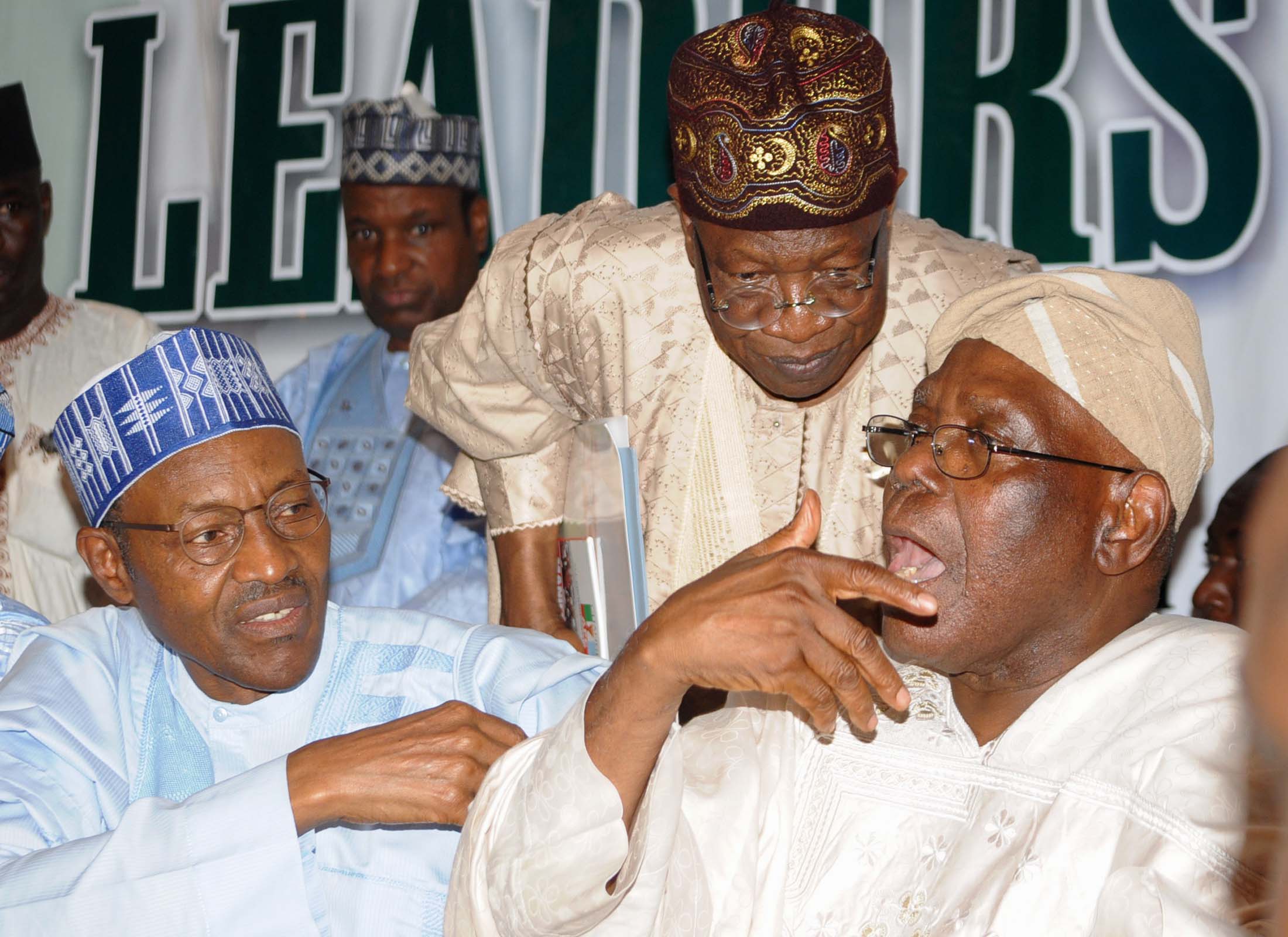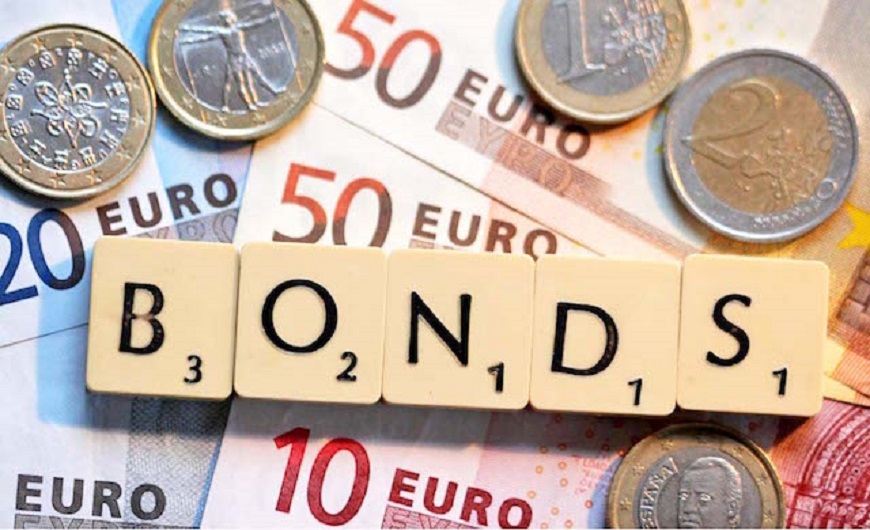Economy
FG to Sell $2.5b Eurobond in October to Fund 2017 Budget

By Modupe Gbadeyanka
Next month, Nigeria plans to sell $2.5 billion Eurobond and proceeds from the sale would be used to fund the 2017 budget, Bloomberg reports.
Also, after the October Eurobond sale, the Federal Government will issue another $3 billion Eurobond before the end of the year, the reputable media outfit added.
This would bring to $7 billion the country has sold this year alone.
Here is the Bloomberg report
Nigeria plans to sell as much as $5.5 billion of Eurobonds in the next three months to fund capital projects and replace local-currency debt, according to the Debt Management Office. Yields on existing bonds rose to the highest in two months.
The new offers would bring the amount raised through Eurobond sales by Africa’s most-populous nation this year to more than $7 billion as President Muhammadu Buhari’s administration restructures its debt portfolio to almost double the portion of foreign borrowing in a bid to reduce financing costs.
The government wants to raise $2.5 billion in October to help fund 2017’s 7.4 trillion-naira ($20.8 billion) budget, the biggest yet, DMO Director-General Patience Oniha said on Wednesday in an interview in the capital, Abuja. It will sell the remaining $3 billion before the end of the year to replace naira-denominated debt, she said.
The government’s advisers “have told us the market is waiting,” Oniha said. “Work is already ongoing and we are just waiting for a resolution from the National Assembly to proceed.”
The yield on Nigeria’s $500 million of Eurobonds due July 2023 rose four basis points by 1:26 p.m. in London, extending Wednesday’s 15 basis-point climb, to 5.49 percent, the highest since Aug. 21. That on the nation’s dollar securities due in 2032 increased six basis points to 6.91 percent, the highest since July 18.
Citigroup Inc. and Standard Chartered Plc, which helped Nigeria sell bonds this year, will be retained as bookrunners for the $2.5 billion, and are in talks with the government to also lead the $3 billion sale, Oniha said.
Increase Proportion
Nigeria’s overall foreign debt, which includes funds from partners and the Export-Import Bank of China, stood at $15.1 billion as of June 30, while domestic debt was 14.1 trillion naira, the National Bureau of Statistics said on Sept. 19. The government wants to increase the proportion of foreign borrowing to 40 percent of total debt stock from under 30 percent currently, Oniha said.
“That will reduce the government’s borrowing costs,” she said. There is an almost 10 percentage-point spread between domestic and foreign borrowing costs and the restructuring debt plan will help save the government hundreds of million dollars in financing costs, Oniha said.
Nigeria’s Eurobonds yield an average 6 percent, compared with about 16 percent for its naira debt, according to Bloomberg indexes
The Monetary Policy Committee on Sept. 26 left its key interest rate at a record high of 14 percent, where it’s been for more than a year, to fight inflation that’s almost double the target and maintain hard-won stability in exchange rates, Governor Godwin Emefiele said. In the second quarter, the economy emerged from a 2016 slump, the deepest in more than a quarter of a century, with gross domestic product rising 0.6 percent from a year earlier.
High domestic borrowing costs are also forcing the DMO to reduce the maturity of naira debt it plans to sell so that it doesn’t lock in unfavorable interest payments over a longer period, Oniha said. “That will be reflected in our next-quarter calendar for bonds,” Oniha said. The government will instead push for more than 15-year tenure on dollar-denominated securities, she said.
“The good news about this is that Nigeria has the capacity to borrow more from the international capital market given improving fundamentals and its relatively low external debt levels, around 4-5 percent of gross domestic product,” Gaimin Nonyane, the London-based economic-research head at Ecobank International Group, said. “Some of these funds are likely to be used to finance the 2018 maturing debt of $500 million.”
While Nigeria’s debt to GDP ratio is among the lowest in Africa, its interest payments-to-revenue ratio doubled last year to 66 percent of revenue, according to the International Monetary Fund.
The government is looking to plug a 2017 budget deficit that it forecast at 2.3 trillion naira, or 2.2 percent of GDP following a revenue shortfall caused by the decline of output and price of oil, its main export. About one-third of this year’s budget will be invested in new roads, rail, ports and power as part of a wider plan to help the economy recover from a 1.6 percent contraction last year, boost growth to 7 percent, and create 15 million jobs by 2020.
Source: Bloomberg
Economy
Why Transparency Matters in Your Choice of a Financial Broker

Choosing a Forex broker is essentially picking a partner to hold the wallet. In 2026, the market is flooded with flashy ads promising massive leverage and “zero fees,” but most of that is just noise. Real transparency is becoming a rare commodity. It isn’t just a corporate buzzword; it’s the only way a trader can be sure they aren’t playing against a stacked deck. If a broker’s operations are a black box, the trader is flying blind, which is a guaranteed way to blow an account.
The Scam of “Zero Commissions”
The first place transparency falls apart is in the pricing. Many brokers scream about “zero commissions” to get people through the door, but they aren’t running a charity. If they aren’t charging a flat fee, they are almost certainly hiding their profit in bloated spreads or “slippage.” A trader might hit buy at one price and get filled at a significantly worse one without any explanation. This acts as a silent tax on every trade. A transparent broker doesn’t hide the bill; they provide a live, auditable breakdown of costs so the trader can actually calculate their edge.
The Conflict of Market Making
It is vital to know who is on the other side of the screen. Many brokers act as “Market Makers,” which is a polite way of saying they win when the trader loses. This creates a massive conflict of interest. There is little incentive for a broker to provide fast execution if a client’s profit hurts their own bottom line. A broker with nothing to hide is open about using an ECN or STP model, simply passing orders to the big banks and taking a small, visible fee. If a broker refuses to disclose their execution model, they are likely betting against their own clients.
Regulation as a Safety Net
Transparency is worthless without an actual watchdog. A broker that values its reputation leads with its licenses from heavy-hitters like the FCA or ASIC. They don’t bury their regulatory status in the fine print or hide behind “offshore” jurisdictions with zero oversight. More importantly, they provide proof that client funds are kept in segregated accounts. This ensures that if the broker goes bust, the money doesn’t go to their creditors—it stays with the trader. Without this level of openness, capital is essentially unprotected.
The Withdrawal Litmus Test
The ultimate test of a broker’s transparency is how they handle the exit. There are countless horror stories of traders growing an account only to find that “technical errors” or vague “bonus terms” prevent them from withdrawing their money. A legitimate broker has clear, public rules for getting funds out and doesn’t hide behind a wall of unreturned emails. If a platform makes it difficult to see the exit strategy, it’s a sign that the front door should have stayed closed.
Conclusion
In 2026, honesty is the most valuable feature a broker can offer. It is the foundation that allows a trader to focus on the charts instead of worrying if their stops are being hunted. Finding a partner with clear pricing, honest execution, and real regulation is the first trade that has to be won. Flashy marketing is easy to find, but transparency is what actually keeps a trader in the game for the long haul.
Economy
Nigeria’s Stock Market Indices Shrink 0.41% Amid Panic Sell-Offs

By Dipo Olowookere
The Nigerian Exchange (NGX) Limited came under panic sell-offs on Thursday, as the investing community awaits the outcome of a probe into trading activities around one of the stocks on the bourse.
On Monday, trading in Zichis equities was prohibited by the regulator after it gained almost 900 per cent in one month of being listed by introduction on the growth board of the exchange.
This action triggered cautious trading on Customs Street, and things have not remained the same since then.
Yesterday, the key performance indices of the Nigerian bourse further depreciated by 0.41 per cent, the third straight loss this week, as investors book profit before being trapped.
It was observed that the energy industry gained 0.12 per cent and was the only one in green, as the industrial goods space shed 1.19 per cent, the banking counter depreciated by 0.63 per cent, the insurance sector lost 0.32 per cent, and the consumer goods segment tumbled by 0.03 per cent.
As a result, the All-Share Index (ASI) contracted by 802.39 points to 193,567.81 points from 194,370.20 points, and the market capitalisation decreased by N515 billion to N124.239 trillion from N124.754 trillion.
During the session, investors traded 868.5 million shares worth N31.5 billion in 69,310 deals compared with the 1.4 billion shares valued at N46.2 billion exchanged in 70,222 deals at midweek, showing a drop in the trading volume, value, and number of deals by 37.96 per cent, 31.82 per cent, and 1.30 per cent, respectively.
Jaiz Bank led the activity chart with 78.9 million equities valued at N1.2 billion, Japaul traded 73.3 million stocks worth N274.8 million, Access Holdings exchanged 66.9 million shares for N1.7 billion, Chams sold 56.9 million equities worth N239.6 million, and Zenith Bank transacted 45.5 million stocks valued at N4.1 billion.
The worst-performing stock for the day was Jaiz Bank after it lost 9.98 per cent to trade at N12.63, Ikeja Hotel declined by 9.90 per cent to N37.75, John Holt shrank by 9.90 per cent to N8.65, Enamelware slipped by 9.88 per cent to N36.50, and Cadbury went down by 9.69 per cent to N61.95.
On the flip side, FTN Cocoa was the best-performing stock after it gained 10.00 per cent to sell for N6.05, RT Briscoe improved by 9.95 per cent to N11.38, Deap Capital soared 9.92 per cent to N6.98, Japaul grew by 9.91 per cent to N3.77, and Ellah Lakes surged 9.72 per cent to N11.85.
Investor sentiment remained bearish as the exchange finished with 30 price gainers and 38 price losers, implying a negative market breadth index.
Economy
Champion Breweries Concludes Bullet Brand Portfolio Acquisition

By Aduragbemi Omiyale
The acquisition of the Bullet brand portfolio from Sun Mark has been completed by Champion Breweries Plc, a statement from the company confirms.
This marks a transformative milestone in the organisation’s strategic expansion into a diversified, pan-African beverage platform.
With this development, Champion Breweries now owns the Bullet brand assets, trademarks, formulations, and commercial rights globally through an asset carve-out structure.
The assets are held in a newly incorporated entity in the Netherlands, in which Champion Breweries holds a majority interest, while Vinar N.V., the majority shareholder of Sun Mark, retains a minority stake.
Bullet products are currently distributed in 14 African markets, positioning Champion Breweries to scale beyond Nigeria in the high-growth ready-to-drink (RTD) alcoholic and energy drink segments.
This expansion significantly broadens the brewer’s addressable market and strengthens its revenue base with an established, profitable portfolio that already enjoys strong brand recognition and consumer loyalty across multiple markets.
“The successful completion of our public equity raises, together with the formal close of the Bullet acquisition, marks a defining moment for Champion Breweries.
“The support we received from both existing shareholders and new investors reflects strong confidence in our long-term strategy to build a diversified, high-growth beverage platform with pan-African scale.
“Our focus now is on disciplined execution, integration, and delivering sustained value across markets,” the chairman of Champion Breweries, Mr Imo-Abasi Jacob, stated.
Through this transaction, Champion Breweries is expected to achieve enhanced foreign exchange earnings, expanded distribution leverage across African markets, integrated supply chain efficiencies, portfolio diversification into high‑growth consumer beverage categories, and strengthened presence in the RTD and energy drink segments.
The acquisition accelerates Champion Breweries’ transition from a regional brewing business to a multi-category consumer platform with continental reach.
Bullet Black is Nigeria’s leading ready-to-drink alcoholic beverage, while Bullet Blue has built a strong presence in the energy drink category across several African markets.
-

 Feature/OPED6 years ago
Feature/OPED6 years agoDavos was Different this year
-
Travel/Tourism10 years ago
Lagos Seals Western Lodge Hotel In Ikorodu
-

 Showbiz3 years ago
Showbiz3 years agoEstranged Lover Releases Videos of Empress Njamah Bathing
-

 Banking8 years ago
Banking8 years agoSort Codes of GTBank Branches in Nigeria
-

 Economy3 years ago
Economy3 years agoSubsidy Removal: CNG at N130 Per Litre Cheaper Than Petrol—IPMAN
-

 Banking3 years ago
Banking3 years agoSort Codes of UBA Branches in Nigeria
-

 Banking3 years ago
Banking3 years agoFirst Bank Announces Planned Downtime
-

 Sports3 years ago
Sports3 years agoHighest Paid Nigerian Footballer – How Much Do Nigerian Footballers Earn
















